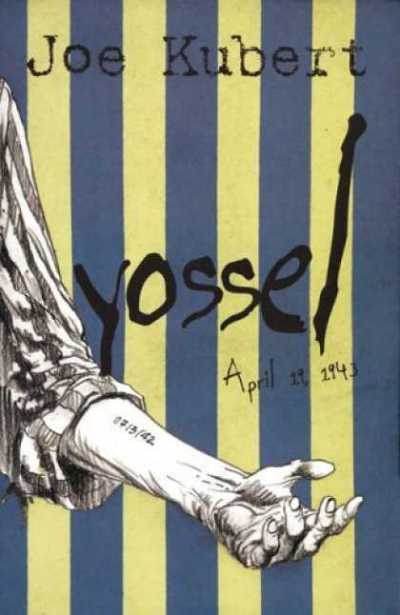Yossel
Reviewed by Martin Skidmore 19-May-11
In this graphic novel, one of the all-time great American comic artists imagines how his life might have gone had his family not left Poland in 1926. As with other Jews, they end up in the Warsaw ghetto. Joe, at 16 (in reality he was a successful artist at DC by then), is soon left orphaned, treated better than most by the Nazis because his drawings entertain them. The story climaxes with the Warsaw Ghetto uprising in 1943, one of the most desperately tragic events in modern history, where handfuls of half-starved Jews with a few stolen and improvised weapons tried to fight back against thousands of German soldiers, with tanks, flame throwers and so on, because they knew that not fighting back meant a trip to the death camps.
In this graphic novel, one of the all-time great American comic artists imagines how his life might have gone had his family not left Poland in 1926. As with other Jews, they end up in the Warsaw ghetto. Joe, at 16 (in reality he was a successful artist at DC by then), is soon left orphaned, treated better than most by the Nazis because his drawings entertain them. The story climaxes with the Warsaw Ghetto uprising in 1943, one of the most desperately tragic events in modern history, where handfuls of half-starved Jews with a few stolen and improvised weapons tried to fight back against thousands of German soldiers, with tanks, flame throwers and so on, because they knew that not fighting back meant a trip to the death camps.
It’s a harrowing story, diverted in the middle by the account of an escapee from the death camps, the first the people in the ghetto knew that they were not work camps. It’s hard to read, hugely depressing, and as ever, it made me angry. This is clearly an important achievement, as it is vital that none of this is ever forgotten; but that doesn’t make it any kind of a pleasure to read. Maybe, as someone who is currently wasting away from terminal cancer, it was extra hard for me to read about people starved and worked to death. This therefore has to come with a warning: yes, we need to know about and face the evil humanity has done, but don’t expect to enjoy facing it.
But of course Kubert is among the greatest artists in American comics ever (probably top five or so, for me), so at least we can expect thrilling comic art, right? Well, partly no. This is not really created as a comic. It comprises text in boxes, mixing narration and dialogue, with accompanying pencil drawings on a marbled grey ground, with occasional touches of white. No word balloons or panel borders, and very few sequences of images – it barely qualifies as comics.
Some of the drawings look less like pencils ready for inking than thumbnail preparatory sketches, but a lot have enormous power. The fact that it is all pencils gives a rare sense of immediacy, and roughens and loosens the style even more than is usual with Kubert. The compositions are almost uniformly superb, and the images often live up to the potency of the text, in particular enhancing the emotional impact with a lot of genuinely great faces that you can study for ages, and of course there are some hugely dramatic action pics too – everyone will know how well Kubert can depict a grenade exploding amongst Nazis from countless Sgt Rock comics.
I don’t know whether to recommend this. It is a work of immense force and deep feeling, in the story and art, but the emotions are so completely awful that you may well choose not to want to experience it at all. I found it more direct and therefore affecting than, for instance, Maus. I’m glad I read it, and I have a very high opinion of its quality, but I suspect I will not read it again. I’m not sure I could bear to; and this can be regarded as a recommendation or its complete opposite, as you choose.
Tags: DC, Joe Kubert